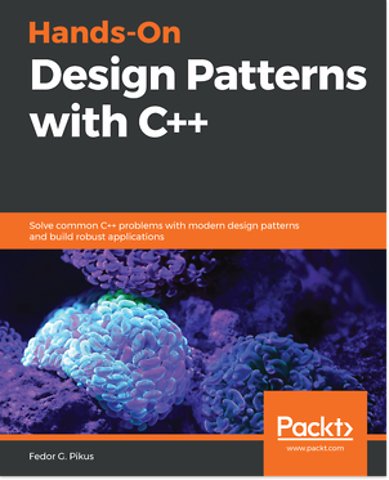

Fedor G. Pikus is a chief engineering scientist in the Design-to-Silicon division of Mentor Graphics (a Siemens business), and is responsible for the long-term technical direction of Calibre products, the design and architecture of software, and research into new software technologies.
Meer over Fedor PikusHands-On Design Patterns with C++
Solve common C++ problems with modern design patterns and build robust applications
Paperback Engels 2019 1e druk 9781788832564Samenvatting
C++ is a general-purpose programming language designed with the goals of efficiency, performance, and flexibility in mind. Design patterns are commonly accepted solutions to well-recognized design problems. In essence, they are a library of reusable components, only for software architecture, and not for a concrete implementation.
The focus of this book is on the design patterns that naturally lend themselves to the needs of a C++ programmer, and on the patterns that uniquely benefit from the features of C++, in particular, the generic programming. Armed with the knowledge of these patterns, you will spend less time searching for a solution to a common problem and be familiar with the solutions developed from experience, as well as their advantages and drawbacks. The other use of design patterns is as a concise and an efficient way to communicate. A pattern is a familiar and instantly recognizable solution to specific problem; through its use, sometimes with a single line of code, we can convey a considerable amount of information. The code conveys: "This is the problem we are facing, these are additional considerations that are most important in our case; hence, the following well-known solution was chosen."
By the end of this book, you will have gained a comprehensive understanding of design patterns to create robust, reusable, and maintainable code.
What You Will Learn
- Recognize the most common design patterns used in C++
- Understand how to use C++ generic programming to solve common design problems
- Explore the most powerful C++ idioms, their strengths, and drawbacks
- Rediscover how to use popular C++ idioms with generic programming
- Understand the impact of design patterns on the program’s performance
Specificaties
Lezersrecensies
Inhoudsopgave
2: CLASS AND FUNCTION TEMPLATES
3: MEMORY OWNERSHIP
4: SWAP - FROM SIMPLE TO SUBTLE
5: A COMPREHENSIVE LOOK AT RAII
6: UNDERSTANDING TYPE ERASURE
7: SFINAE AND OVERLOAD RESOLUTION MANAGEMENT
8: THE CURIOUSLY RECURRING TEMPLATE PATTERN
9: NAMED ARGUMENTS AND METHOD CHAINING
10: LOCAL BUFFER OPTIMIZATION
11: SCOPEGUARD
12: FRIEND FACTORY
13: VIRTUAL CONSTRUCTORS AND FACTORIES
14: THE TEMPLATE METHOD PATTERN AND THE NON-VIRTUAL IDIOM
15: SINGLETON - A CLASSIC OOP PATTERN
16: POLICY-BASED DESIGN
17: ADAPTERS AND DECORATORS
18: THE VISITOR PATTERN AND MULTIPLE DISPATCH
Anderen die dit boek kochten, kochten ook
Rubrieken
- advisering
- algemeen management
- coaching en trainen
- communicatie en media
- economie
- financieel management
- inkoop en logistiek
- internet en social media
- it-management / ict
- juridisch
- leiderschap
- marketing
- mens en maatschappij
- non-profit
- ondernemen
- organisatiekunde
- personal finance
- personeelsmanagement
- persoonlijke effectiviteit
- projectmanagement
- psychologie
- reclame en verkoop
- strategisch management
- verandermanagement
- werk en loopbaan





